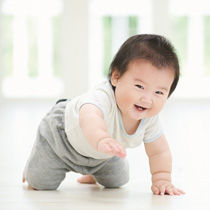Breastfeeding is the best for babies and a healthy diet / maternal nutrition is important when breastfeeding. A decision not to breastfeed can be difficult to reverse. Infant formula is suitable from birth when babies are not breastfed. It is recommended that all formula milks be used on the advice of a doctor, midwife, health visitor, public health nurse, dietitian, pharmacist, or other professional responsible for maternal and child care and the financial implications should be considered. All preparation and feeding instructions should be followed carefully as inappropriate preparation could lead to health hazards.
What To Do When Your Child Cries
Some mums and dads worry that if they respond too quickly when their baby cries they'll spoil them. However, research shows that babies who are responded to quickly actually cry less as toddlers.
Comforting your baby quickly when they cry lets them know you are there for them, and makes them feel secure.
Possible reasons for your baby's cries
- They're hungry
- They're too hot or too cold
- They have colic or wind
- They need changing
- They're in pain
- They're bored
- They're over-stimulated
- They want a cuddle
Most of these causes can be solved fairly quickly and easily and once responded to, your baby should soon settle in again. However, if your baby's crying seems unusual or goes on for too long, speak to your doctor.
Colic
If your baby is under three months old and is crying excessively, they may have colic. It's not possible to sure colic, but there are some soothing techniques you can try.
Ideas for soothing a colicky baby
- Give them a cuddle
- Encourage them to suck on something
- Wind them
- Play some soft music or sing to them
- Gently massage them
- Bathe them
- Carry them in a baby carrier or sling
- Take them out for a walk
Crying in older babies
Once your baby passes the newborn stage, there are some other possible reasons they may be crying:
- They've lost their comforter
- They want company
- They've bumped themselves
- They're teething
- Separation anxiety
- Newly developed fears
A cuddle can do wonders to soothe an unsettled baby if there is nothing physically wrong. If the crying continues or your baby seems to be uncomfortable as well as distressed, it might be a good idea to talk to your doctor.
Coping with excessive crying
- Although it may not seem like it at times (especially if they're suffering from colic) your baby won't cry forever! If you're finding excessive crying hard to deal with, try to take a break. Even a few quiet minutes with a cup of tea can make all the difference. If you feel like things are getting on top of you, have a word with your doctor. They're there to help you and your baby.
Disclaimer: All content on this Website is provided solely for informational purposes and is not intended as a substitute for medical and/or other professional advice for your specific condition. Please do not disregard medical and/or other professional advice or delay seeking it because of something you have read on this Website. Always seek medical advice before starting any new treatments.


Ask Our Careline
Whatever’s on your mind, we’re here to help



